Note
just curious: are you an undergrad student or a postgrad student? i’ve been intermittently working on a paper on tsh for grad school, so i’m enjoying your content a lot rn.
Hi! Apologies for the extremely slow response -- I'm a post grad! But mostly going this for fun. Also, if you'd be willing to upload your paper somewhere when you're done, I would really love to read it
1 note
·
View note
Text
“What shocked me most weren’t the sounds he made, the bulging of his eyes, the colour he went—not even the shit. It was just easy. …his breathing was so faint, and his neck was so thin, it just… He just died.” — Boy Parts, p. 215
"It wasn't until I had helped to kill a man that I realised how elusive and complex an act of murder can actually be." – TSH, p. 254
versus
"But for now, one thought, one voice: 'How easy it was.' How simple. Anybody could have done this. There is no mystery to death." – Party Monster.
4 notes
·
View notes
Text
“[Susan] Sontag talks about how when people see terrible things happen, they used to say it felt like a dream, but now they say it feels like a movie. Movies have supplanted dreams in the popular consciousness, and have become our benchmark for the unreal, and the almost real.”
— p. 208 Boy Parts, Eliza Clark
and
“You see, then, how quick it was. And it is impossible to slow down this film, to examine individual frames…A barrage of frightened crows explodes from the underbrush…Cut to Henry, stepping back from the edge. Then the film flaps up in the projector and the screen goes black. Consummatum est.”
— p. 310, The Secret History
16 notes
·
View notes
Text
“A month or two before, I would have been appalled at the idea of any murder at all. But that Sunday afternoon, as I actually stood watching one, it seemed the easiest thing in the world. How quickly he fell, how soon it was over.” — TSH, p. 311
"It wasn't until I had helped to kill a man that I realised how elusive and complex an act of murder can actually be." – TSH, p. 254
versus
"But for now, one thought, one voice: 'How easy it was.' How simple. Anybody could have done this. There is no mystery to death." – Party Monster.
4 notes
·
View notes
Text
Titanic references
The Titanic is humorously/not so humorously referred to twice in Book 1 of TSH, both times to do with death and fate:
First by Camilla in Francis’ house, joking that a relative of his went down with the Titanic.
A second time on p. 297 by Richard, talking about a switchboard monitor in Hampden ignoring incoming calls (as he is trying to make some to warn Henry that Bunny isn’t coming to the ravine) saying the monitor is “as oblivious as that ill-omened wireless operator on the Californian the night the Titanic went down.”
The references could be:
To evoke a tragedy of human hubris. At the time of its sinking and since, the Titanic has been talked of like a real-life Greek tragedy, where a fatal flaw in the people who made it led to great carnage.
To evoke images of wealth, especially in Francis’ house: the relative that went down was probably quite rich, as his family is rich, and its the kind of wealth Richard romanticises.
To evoke the themes of oncoming, fated tragedy, esp in the monitor scene: it’s just a few pages before the gang kills Bunny and the Titanic reference contributes to building the tension.
6 notes
·
View notes
Text
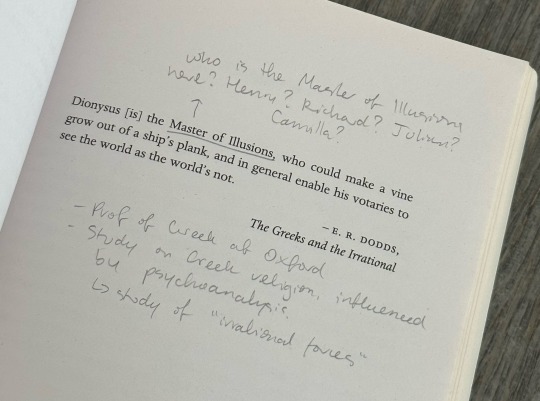
Quote on Book 2
TSH & Illusions/Appearances: recurring theme. All of the characters are, to greater or lesser extent, obsessed with appearances and being something they are not.
Who is the true master of illusion? Richard? Henry? Camilla? Julian?
Also alludes to Richard’s unreliable narratorship: the story could quite literally be an illusion, a lie.
7 notes
·
View notes
Text
I think it's fascinating how literally and without questions some people take everything Richard Papen said, despite him setting himself up as an unreliable narrator from the very beginning.
371 notes
·
View notes
Text
Richard Papen is the kind of guy to say “i know a spot” and then take you to a run down apartment with a hole in the roof in the middle of winter
486 notes
·
View notes
Text
"It wasn't until I had helped to kill a man that I realised how elusive and complex an act of murder can actually be." – TSH, p. 254
versus
"But for now, one thought, one voice: 'How easy it was.' How simple. Anybody could have done this. There is no mystery to death." – Party Monster.
4 notes
·
View notes
Text
Believing the hype
"Do you know," he said, "What Julian says about the Divine Comedy?"
"No, Henry, I don't."
"That it's incomprehensible to someone who isn't a Christian. That if one is to read Dante, and understand him, one must become a Christian if only for a few hours?"
-- TSH, p. 184
Believing the hype, entering the fantasy, letting yourself be swept away by delusion are big themes in TSH, and big themes in readers who read TSH.
TSH is both about exploring the power of aesthetic and undermining it. Hampden is at once heaven and hell. The gang are at once admirable and pitiable, ethereal and silly, intelligent and idiotic.
You gotta get swept up by the hype to enjoy TSH while at the same time being able to see through it.
9 notes
·
View notes
Text
Terror = beauty
Richard doesn't only think that beauty is terror, he finds terror beautiful. This view of his is reflected and echoed by Henry.
"Morning light can make the most vulgar things tolerable" – Henry, p.91
"Reality was transforming itself around us in some beautiful and dangerous fashion" – Henry, p.185
"I've always been drawn to broken, wild terrain" – Henry, p.233
Henry finds beauty in the terrible, scary experience of the bacchanal; he arguably finds it so beautiful because it was so frightening. If we remember that this is Richard recalling what Henry has said to him, we can argue that Richard too agrees with this view.
(After all, Richard has no problem being hypocritical and self-obfuscating, so if something is presented in a certain light in the text, its because Rich has decided to do so) (will talk more on that)
Meanwhile, Richard tries to romanticise himself literally dying, referring to the "beauty" of his surroundings in the winter episode as he is in the midst of a hypothermia episode.
5 notes
·
View notes
Text
"If anything could be relied upon with almost mathematical certainty, is that Bunny, at any given meal, would somehow eat almost twice as much as anyone else."
TSH, page 260
TSH has these passages which are both funny and kind of worrying.
Bunny had a deprived childhood. We learn, mostly from Henry, that Bunny's parents are penniless but appearance-driven, and that they have instilled this same attitude into Bunny.
Beyond not giving him money and attention and care, there are also subtle hints that they didn't give him food:
The above isn't the first comment about Bunny eating more than anyone else; very many of his contentious moments revolve around food and restaurants. He always orders too much, he always eats too much, he's always asking if there's anything to eat or drink. He overindulges like it's the last time he'll be able to.
8 notes
·
View notes
Text
Fate & Destiny
Fate and destiny are themes in TSH that are linked to the Greek origin (with Fate being a bigass player in Greek myth and drama) and, to some extent, Gothic. It also plays into Richard's unreliable narration. Let me elaborate:
Richard ends up at Hampden through a series of, essentially, coincidences:
In Cali, he takes Greek "so I could sleep late on Mondays. I was an entirely random decision which, as you will see, turned out to be quite fateful" (emph. mine).
He finds the Hampden pamphlet because he shakes a random coat in his closet and it falls out of the pocket. He doesn't know why its in his closet, "I suppose I'd saved it because it was so pretty". His morbid longing pops up.
He says, "Even today I do not fully understand the chain of events that brought me to Hampden", like it was destiny or fate and not really his own doing.
In his very first meeting with Julian, they talk about fate and pre-destiny: "Psychology is only another word for what the ancients called 'fate'".
Julian remarks: "The country people who live around me are fascinating because their lives are so closely bound to fate that they really are predestined". Julian is a classist. Richard, who is poor and not of the same class as the rest of the Classics gang, would be 'country people' in this case, arguably, especially if we remember that the Classics gang "yearns for England" and city/country, gentry/peasant is classic English classism.
This brings into question: Richard believes his admittance to Hampden was fate, who whose fate? He lies about his class and wealth, he pretends to be someone he is not... Does he take over someone else's fate? And if he believes what happened was fate, but so much of his own free will guided it...
The idea of nature and inevitability comes up a bunch--"I am a Californian by birth and also...by nature". He cannot help who he is and what he does, despite trying. Theme of free will, or of accountability? Again, with the above--if it's all fate, but he is lying about who he is, he is pursuing not his "predestined" country people existence but that of the Classics' gang, exercising his free will in the process...
A whole thing. This thought needs to be cooked longer.
7 notes
·
View notes
Text
When Oscar Wilde wrote: "Behind every exquisite thing that existed, there was something tragic". And then Kait Rokowski said:"Nothing ever ends poetically. It ends and we turn it into poetry. All that blood was never once beautiful. It was just red.". But also Donna Tartt wrote: "Death is the mother of beauty." and "Beauty is terror. Whatever we call beautiful, we quiver before it.".
4K notes
·
View notes
Text
parallels between ‘the secret history’ and ‘the picture of dorian gray’
i’ve recently reread two of these books back to back and i couldn’t help but notice some of their similarities, so here you go
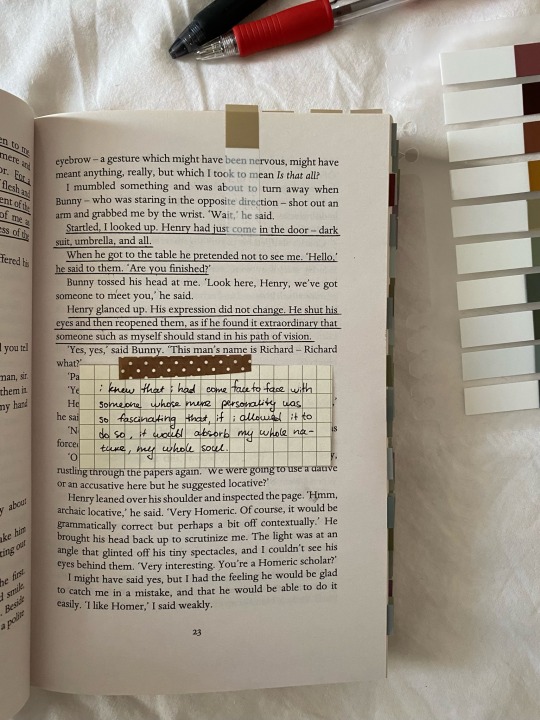
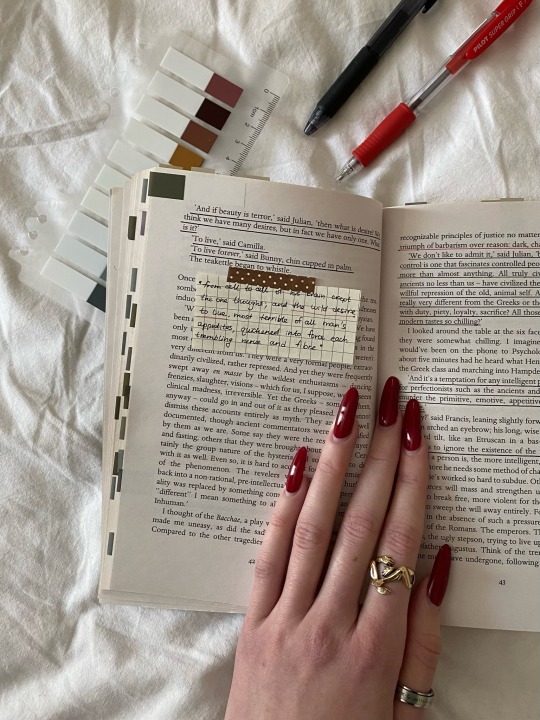
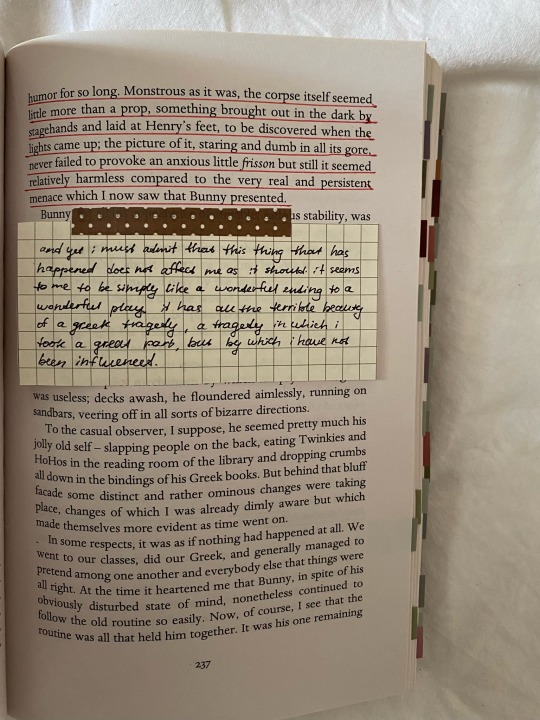

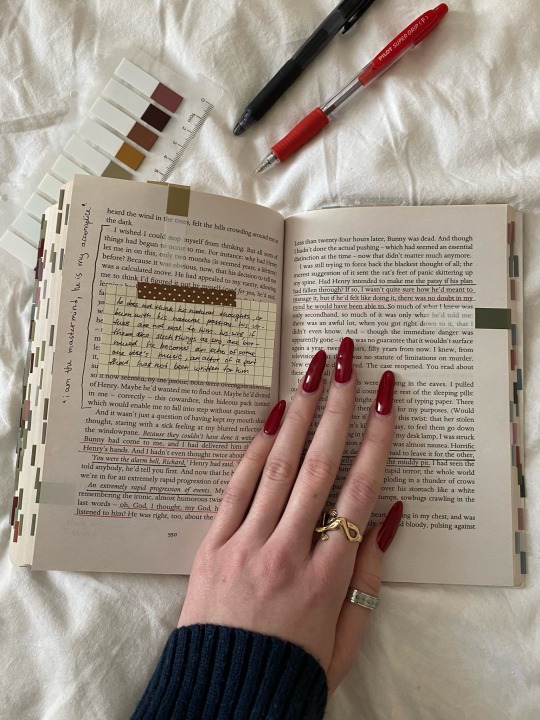
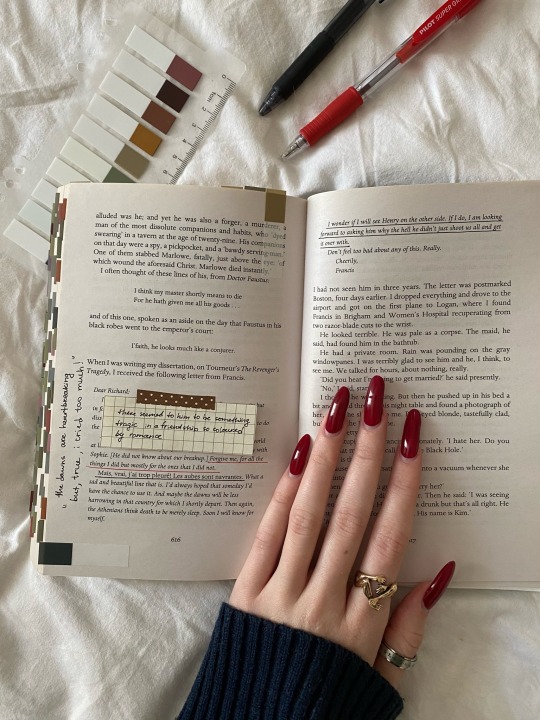
this is just a small part of all of my annotations in tsh and like 90% of them are quotes from ‘the picture of dorian gray’
121 notes
·
View notes
Text
Thoughts on Henry (and Julian)
Henry Winter is such an interesting character, because Richard presents him as this suave, detached, cold, in-control figure, and Richard really idolises him. He's very impressed by Henry, he sees Henry as everything he wants to be and to have (and as a result, so do many readers)
but as soon as we step away from Richard's romanticised view, we can pick up hints that Henry is just a kid who's really desperate for an adults approval--Julian's. We can see this from the start:
Henry buys the same pens that Julian has (and Julian was with him when he bought it, thankyouverymuch), he talks like Julian, he dresses like Julian, he's constantly meeting with and talking with Julian. He's inviting Julian for dinners at the house even though Julian rejects him 60% of the time...
Later, he's desperate to make sure Julian doesn't find out what they did, and when he does and abandons them, Henry is lost and heartbroken. You can read his defeat at the end almost like a result of Julian's abandonment of them.
Julian is pretentious and he does use cult-like tactics (isolating them from the rest of the college, basically telling them to only listen to him (the "better know one work well than many lightly" quote comes from him!! its also bad literary advice lmao)) and Henry falls hardest for them. You can sense he is someone who didn't have adult support, or much social support entirely, growing up, and he's latched onto Julian and the Classics as a replacement family.
again referring to Dorian Gray, Julian is kind of like Henry Wotton, who talks the talk but doesn't walk the walk--Julian is very eager to talk about violence, about seizing the town and about how beauty is terror and love is horror (just like Wotton talks a big load of shite about sin and how its the only way to live life), but as soon as their proteges actually do something, they vanish.
20 notes
·
View notes
Text
richard was nick henry was his gatsby and camilla was their daisy i am unwell i need to go lie down
88 notes
·
View notes